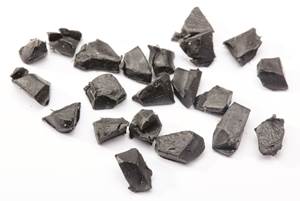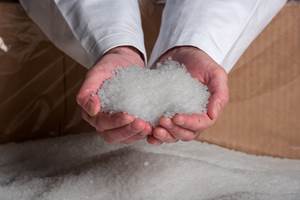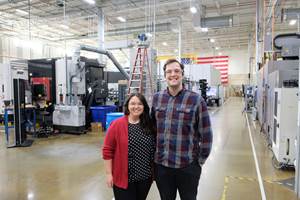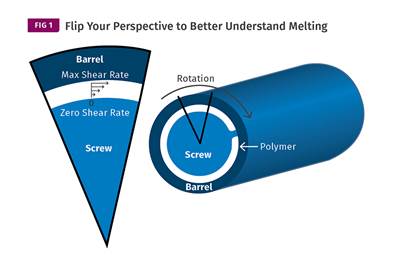HP, Lonely Whale Discuss Scaling the Use of Ocean-Bound Plastic
Ellen Jackowski, global head of sustainability strategy and innovation at HP Inc., and Dune Ives, executive director at Lonely Whale, discuss developing the first global network of ocean-bound plastics supply chains.
NextWave Plastics, a consortium of worldwide businesses led by Lonely Whale that is dedicated to developing the first global network of ocean-bound plastics supply chains, announced that HP Inc. and Ikea will join its ranks.
In 2017, as part of a United Nations commitment to Sustainable Development Goal 14, Dell Technologies and Lonely Whale launched NextWave Plastics. The goal was to build on Dell’s ocean-bound plastic program launched in 2016 and bring together a cross-industry consortium of companies to work together in a collaborative, open-sourced and transparent fashion to create the first global network of ocean-bound plastics supply chain and scale the use of ocean-bound plastics. You can learn more about Dell’s involvement in my story about ocean-bound plastics here.
I recently spoke with Ellen Jackowski, global head of sustainability strategy and innovation at HP Inc., and Dune Ives, executive director at Lonely Whale, to talk more about the global network of ocean-bound plastics.
HP’s Journey
Since announcing in September 2016 that it would join the First Mile Coalition to clean up plastic waste and create economic opportunity for the people of Haiti, HP and its partners have successfully built a fully functioning ocean-bound plastics supply chain using bottles collected in Haiti. The company announced on Monday that it has sourced 250 tonnes of ocean-bound plastics from Haiti and created more than 600 income opportunities for adults in the country. That’s more than 12 million plastic bottles that have not entered the Caribbean Sea and instead are being upcycled into Original HP ink cartridges.
“This is all part of our circular economy strategy and something HP has been working on for quite some time,” Jackowski of HP says. “We’ve been using recycled content in our cartridges for over a decade.” Over 80 percent of HP ink cartridges and 100 percent of HP LaserJet toner cartridges contain recycled content.
Since the company has already been using recycling material, it’s familiar with the pricing and processing. She said what the company didn’t want to do is set up an ocean-bound program that works for a year or two and then have to cancel due to cost. So, it began with the price they pay for collectors; they set a minimum that collectors can make that will still have a positive impact on their livelihood.
Jackowski says that it took a learning curve when it came to working with Haitian suppliers to ensure the material is up to the company’s standards.
“The quality of the ink is crucial, and we need to make sure the plastic doesn’t interact with the ink,” she says. “So, where we source from and the quality of plastic is really important and we spent a lot of time improving that quality.”
Here’s a video of HP’s ocean-bound plastic program:
Collaboration Is Key
Since its launch, NextWave member companies including Bureo, Dell Technologies, General Motors, Herman Miller, Humanscale, Interface and Trek Bicycle. They have each been developing their product use cases to demonstrate the viability of integrating ocean-bound plastics into their supply chains. The addition of new member companies supports greater demand for these plastics and strengthens supply chain stability.
“We knew when we started the initiative that we would need to bring more partners on board to help build the ocean-bound supply chains,” says Ives of Lonely Whale. “It’s truly collaborative and a really good illustration of how the market can lead the way—but one company can’t do it alone.”
NextWave member companies are currently sourcing verified ocean-bound plastics from Cameroon, Chile, Denmark, Haiti, Indonesia and the Philippines. They are committed to expanding supply chain efforts in those countries and adding new sources of supply from a minimum of three additional countries including India, Taiwan, and Thailand by the year 2025. Through these efforts, NextWave companies will also expand the types of material sourced and will work closely with other supply chain development initiatives to create scale within priority communities.
“Having HP and Ikea on board allows us to scale up, and we’re excited to learn from them as we optimize the supply chains,” Ives says. “As far as establishing ocean-bound plastics as a commodity, unless ocean-bound plastic has value, it’s going to be difficult to sustain for the long-term. The supply chain development will focus not just on one-use cases but on multiple products.”
Ives says that the organization recognizes that if the process is too expensive, it’s not going to be a viable solution for companies.
“Companies working together as a global network can scale up to efficient levels to allow us to meet demand for the right price point—this is really important to us,” she says. “We want to make sure there’s a continuity core of work we are doing and we’re looking at different geography locations to create stability in supply chain.”
Jackowski says that HP is moving into the direction of using more recycled plastics in its products.
“The plastics supply chain is incredibly powerful and we’re at a moment where we need a direct call to action— turn off the tap of using virgin and move to a world where we need to use recycled plastic,” she says. “We need partners to make that happen. Help us build the capability and vision where the world is relying on recycled plastic.”
Related Content
Avoid Four Common Traps In Granulation
Today, more than ever, granulation is an important step in the total production process. Our expert explains a few of the many common traps to avoid when thinking about granulators
Read MoreHow to Optimize Injection Molding of PHA and PHA/PLA Blends
Here are processing guidelines aimed at both getting the PHA resin into the process without degrading it, and reducing residence time at melt temperatures.
Read More‘Monomaterial’ Trend in Packaging and Beyond Will Only Thrive
In terms of sustainability measures, monomaterial structures are already making good headway and will evolve even further.
Read MoreScaling Up Sustainable Solutions for Fiber Reinforced Composite Materials
Oak Ridge National Laboratory's Sustainable Manufacturing Technologies Group helps industrial partners tackle the sustainability challenges presented by fiber-reinforced composite materials.
Read MoreRead Next
Advanced Recycling: Beyond Pyrolysis
Consumer-product brand owners increasingly see advanced chemical recycling as a necessary complement to mechanical recycling if they are to meet ambitious goals for a circular economy in the next decade. Dozens of technology providers are developing new technologies to overcome the limitations of existing pyrolysis methods and to commercialize various alternative approaches to chemical recycling of plastics.
Read MoreLead the Conversation, Change the Conversation
Coverage of single-use plastics can be both misleading and demoralizing. Here are 10 tips for changing the perception of the plastics industry at your company and in your community.
Read MoreUnderstanding Melting in Single-Screw Extruders
You can better visualize the melting process by “flipping” the observation point so that the barrel appears to be turning clockwise around a stationary screw.
Read More

























